& how it is flourishing in Douglas Co.
| 2014 Q2 | story by ANNE BROCKHOFF | photos by STEVEN HERTZOG |
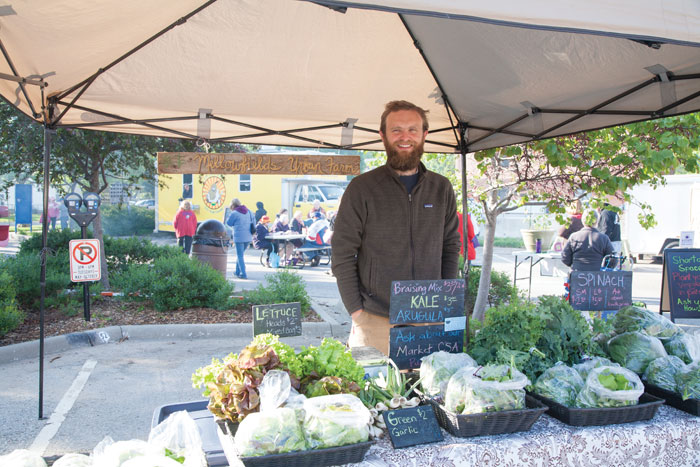
Kevin Prather of Mellowfields
Farming has always been an economic gamble. Each season requires a cash outlay for seed, supplies and labor, months before there’s anything to sell. Storms, drought, pests and disease routinely threaten to wipe out crops. And even in good years, there’s no guarantee buyers will pay a farmer’s asking price for the bounty.
It’s an uncertain model at best, and one that the Rolling Prairie Farmers’ Alliance upended when it launched one of Kansas’ first Community Supported Agriculture (CSA) programs 20 years ago. It was at the time a radical concept that originated in Japan in the 1960s and migrated to Europe before landing in the U.S. in the mid-80s.
At its heart was this question: were consumers hungry enough for local produce to pay for it before it’s even been planted? The answer was yes. Rolling Prairie signed up 100 members in its first year and now has about 300. Another half-dozen CSAs have emerged in Lawrence, and there are by some estimates more than 6,000 nationwide.
CSAs have been a boon to participating farms, partly because they provide capital and market assurance where there has traditionally been little, says Bob Lominska of Hoyland Farm. He and his wife Joy began farming north of Lawrence in 1976 and were among Rolling Prairie’s founders.
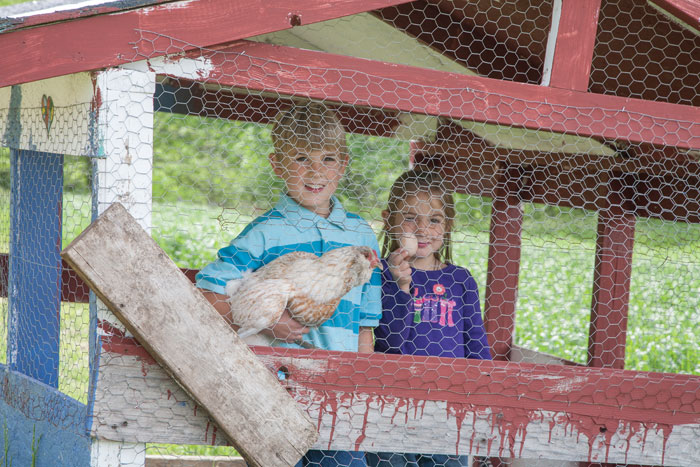
Ethan & Aliya Saunders, Amy’s Meats
“(The CSA) immediately boosted our income and our confidence,” says Lominska, whose son, Avery Lominska, is now a full-time partner in the farm. “It allowed us to invest in more things on our farm and to expand.”
CSAs—sometimes called subscriptions services—are as diverse as the farms that operate them. Most Lawrence-area CSAs require an initial deposit or membership fee and then charge between $12 and $20 (including sales tax) a week in exchange for a set amount of fresh food. Anyone paying the full amount in early spring typically receives a discount.
Members pick up their share at a designated delivery site from May through October, although some CSAs begin earlier or run for fewer or more weeks. The quantity and variety of produce, eggs, meat and other products varies, too, although most include five to eight items per week.
The benefits are many: members receive the freshest local food, directly from farms they’ve built a relationship with, for less than they’d pay for comparable products at the farmers’ market or grocery store. Farmers earn income during historically tight months and get a reliable market for their crops.
CSAs also help build community, support sustainable agriculture (most area ones use organic growing practices) and bolster the economy by generating sales tax and creating employment. Buying from a local farmer returns three times the dollars to the local economy than buying from a chain does, according to the Lawrence-Douglas County Health Department.
“Your dollar’s staying in Douglas County and Lawrence when you support these businesses,” says Jill Elmers, owner of Moon on the Meadow, founder of the Common Harvest CSA and a member of the Douglas County Food Policy Council.
But none of that was obvious in 1994, when a group of northeast Kansas farmers came together to consider the benefits of cooperative marketing as part of the Kansas Rural Center’s Heartland Sustainable Agriculture program. They landed on the idea of a CSA, and Rolling Prairie was born.
It now includes seven farms in Douglas, Jefferson, Franklin and Leavenworth counties: Lominska’s Hoyland Farm, East Stone House Creek Farm, Wakarusa Valley Farm, Maier’s Farm, Sandheron Farm, Conway’s Produce and Buller Family Farm.
Each week, farmers email their “production czar” to say what’s available. The czar then calculates how much of each item is needed from each farm. Growers deliver their products to the appropriate site’s coordinator, who is in charge of recruiting members, collecting payments and overseeing deliveries.
There are four delivery sites, including The Community Mercantile (twice weekly) and Lawrence Memorial Hospital in Lawrence, Johnson County Community College in Overland Park and Roeland Park Community Center in Roeland Park.
Rolling Prairie’s farmers raise everything from asparagus, rhubarb, raspberries, tomatoes, winter squash and apples to husk tomatoes, bok choi, okra, shallots, mushrooms and honey. Most tend to overplant to ensure amply supply for not only the CSA, but also farmers’ market, restaurant and grocery store customers, Lominska says.
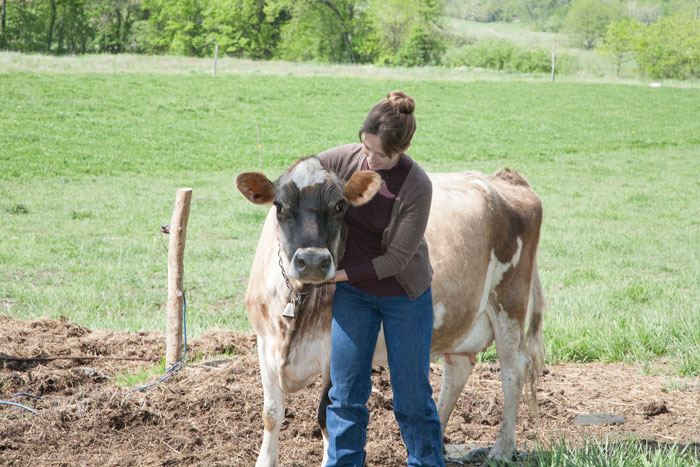
Amy Saunders
Participating in a multi-farm CSA also provides insurance against shortages— if one farmer’s green beans do poorly, another can fill the gap and ensure CSA members aren’t disappointed. But that doesn’t do anything about farming’s inherent difficulties, Lominska says.
“Just growing stuff can be a challenge,” says Lominska. Drought’s been a problem in recent years, and pests are always a worry.
“Sometimes people ask what I do about that. I say you take your losses.”
If running a CSA is hard for established farmers, it can be overwhelming for new ones, says Moon on the Meadow’s Elmers. She routinely advises apprentices to grow for the market first and learn what their farm can reliably produce before offering a CSA.
“CSAs aren’t a great model for beginning farmers,” Elmers says. “There are so many different things you have to grow. You can’t give your CSA members radishes for 26 weeks.”
Elmers began farming in 2000 and started her first CSA in 2007. Then, in 2010, she joined with Jenny and Tom Buller of Buller Family Farm to buy 34 acres on the eastern edge of Lawrence—a venture they dubbed Common Harvest Farms. When they added a CSA of the same name, they brought Red Tractor Farm into the partnership.
None of the three relies entirely on the CSA for its income. Spreading the risk is just good business, says Jen Humphrey, who together with Jessica Pierson owns Red Tractor Farm.
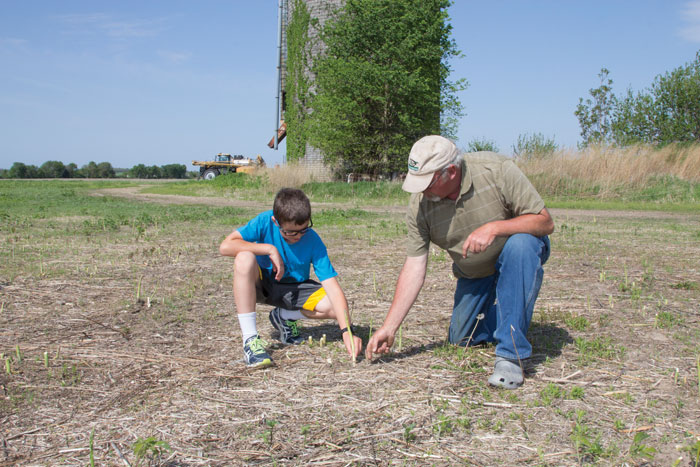
John Pendelton, demonstrates to Sam Hertzog the proper way to pick asparagus

“You want diversified points of sale,” says Humphrey, who counts farmers’ market shoppers, restaurants and grocery stores among her customers. The CSA, however, provides stability.
“You know how many people you’re providing for at the beginning of the season, how much produce you’re selling and that the checks will keep coming every month,” Humphrey says.
As of April, Common Harvest’s CSA had 100 members with room for more, says Elmers, who is the CSA’s paid administrator.
Some members pick their shares up at Moon on the Meadow; others stop at a delivery site in Kansas City’s midtown area. It’s even easier for World Company and Lawrence city employees—the cost is deducted from their paychecks, and Elmers delivers to Lawrence’s city hall.
Pendleton’s Kaw Valley Country Market is also expanding its four-year- old CSA to include more government and business employees, with deliveries to the Douglas County courthouse, jail and extension office; a dental office; and a computer store.
Such corporate CSAs are good business, says Aundrea Shafer, the health promotions specialist at Lawrence-Douglas County Health Department.
“It not only affects the local economy, it’s a good investment in employee health,” says Shafer, who created a Worksite CSA Toolkit to facilitate formation of business CSAs.
The county also encourages CSA participation through the Douglas County Child Development Association’s Healthy Sprouts program, which helps families with young children eat healthier.
The DCCDA tapped Common Harvest for a CSA at Hilltop Child Development Center; KU Endowment employees pick their CSA bags up there, too. Pendleton’s supplies Princeton Children’s Center and Building Blocks Daycare Center.
“Convenience is important,” says Karen Pendleton, who owns Pendleton’s with her husband, John. “The nice thing about daycare and business CSAs is that people are not going to forget to go to work, and they’re not going to forget to pick up their kids.”
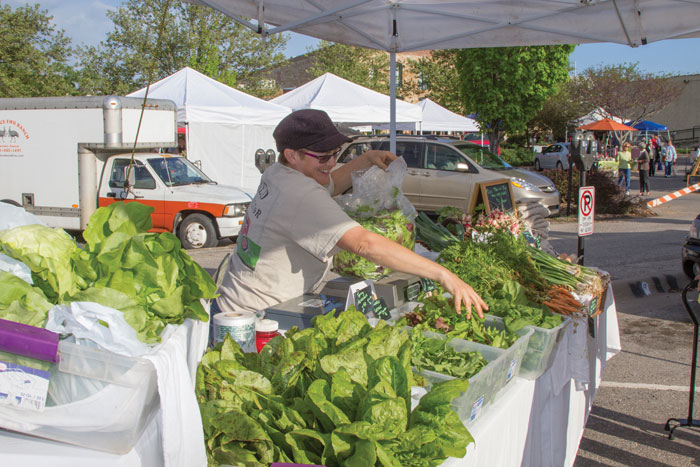
Jen Humphrey, Red Tractor Farm
Flexibility is another key for many people, says Pendleton. The farm makes a CSA delivery at the Wednesday farmers’ market at Clinton Parkway Nursery, offers 12- and 20-week CSAs and has a one-time fall storage crop share pickup in November. Members can even pre- purchase $60 monthly punch cards to buy food, plants and other items at either the farm store or farmers’ market in lieu of paying for a weekly bag of farm-selected produce.
All together, Pendleton’s has about 100 CSA members. Managing it all is well worth the work, Pendleton says.
“It has taken so much stress out of my life,” she says. “Otherwise we wouldn’t have an income in January, February or March.”
And that’s exactly when the Pendletons are gearing up for the year. The first of their 13 or so employees begins in March; others come in April and most stay through November.
Early spinach gives way to a six-week asparagus run, and May marks the advent of flower and wedding season. The Pendleton’s also grow hydroponic tomatoes and all manner of produce, showcase a butterfly bio-villa and host two autumn open houses.
Their farm store, which sells farm-grown bedding plants, fresh and value-added foods, garden supplies and décor and other items, is open seven days a week in April and May, and then shorter hours through the end of the year. Throughout it all, the CSA provides ballast for the business.
“There’s no better feeling in the world than somebody paying in advance for you to grow produce that year,” says Pendleton, who communicates with CSA members and customers via e-newsletters, the farm’s web site and Facebook. “Knowing people chose us to as their provider of fresh produce for the year give us the boost we need on those days when we’ve been working so hard.”
CSAs aren’t limited to vegetables, though. Lulu’s Garden sells herbs to The Merc and area restaurants through a Restaurant Supported Agriculture arrangement, while Maggie’s Farm, in northeast Douglas County, offers a Knitter’s CSA. Members pay $200 for three yarn distributions, which include original patterns, and invitations to farm events like sheep shearing.
And then there’s Amy’s Meats at The Homestead, what owner Amy Saunders describes as a “whole meal” CSA. Saunders’ version includes vegetables, eggs, beef, pork, lamb and chicken, depending on what’s available at the time.
“Everything has a harvest. Meat is that way, too,” she says. “It’s been fun to try to get people to think in that way.”
Saunders began selling custom freezer beef, both in bulk and by the retail cut, from her husband Dan’s herd in 2002. She quickly added a family-sized meat bundle—several cuts of beef along with recipes and a shopping list—and signed up members for what had become one of the Midwest’s first meat CSAs.
By 2006, Saunders was making weekly deliveries to Lawrence and Kansas City. But when the couple moved kids, cows and farming operations to their new home in southeast Jefferson County in 2010, she knew it was time to refocus.
Saunders expanded her CSA offerings, added a cow share option for those wanting a steady supply of raw milk and began teaching members how to make cheese, can and dehydrate vegetables and otherwise preserve their CSA largesse. The family also hosts harvest gatherings, an ice cream social and other events.
It’s not just about money, though. Members must also volunteer 10 hours on the farm, not because Saunders needs the extra labor, but because she wants everyone to truly appreciate the rhythms of the farm and connect to what her family is doing there.
“It’s really fun for their kids to watch the miracles happening in the garden, to see things grow,” she says.
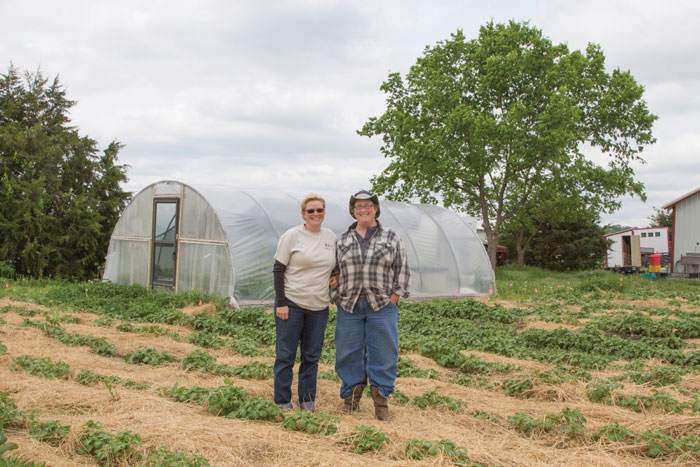
Jen Humphrey & Jess Pierson, Red Tractor Farms
Saunders has fewer members now than she once did—just 15 or 20, mostly from Lawrence and Tonganoxie—but that’s fine with her.
“I service a fraction of the customers I used to,” she says. “But this is where I am in my life, where my kids are, where my family is, and it fits so much better.”
A CSA has also proven a good fit for Kevin Prather and Jessi Asmussen of Mellowfields Urban Farm. They started growing vegetables in their Lawrence back yard years ago and then expanded into rented spaces in town. They sold their output at local farmers’ markets, but liked the added security a CSA offers.
“I don’t want to take 30 heads of lettuce to market, sell 20 and then have 10 to eat in the next week,” says Prather, who quit his teaching job last year to farm full time. “We want to sell it all. With the CSA, if we harvest 20, it’s because we’ve sold 20.”
The Prathers continued to expand their operation, most recently through participation in Lawrence’s Common Ground program. The initiative aims to repurpose empty or underutilized city lots for food production. In 2013, the 120 gardeners and farmers using 5.6 previously idle acres grew 40,000 pounds of produce valued at $80,000, according to Common Ground’s annual report.
“I’ve got nothing but good things to say for Common Ground, and praise for the city for stepping out on a limb with it,” says Prather, who also sells Fertrell organic fertilizer, poultry feed and other products.
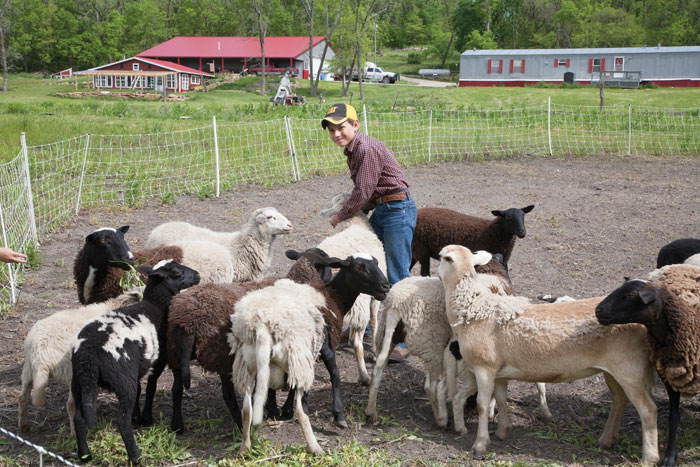
Tucker Saunders, Amy’s Meats
Prather now has about 25 regular CSA members plus what he calls a market CSA—punch cards in $50 increments that can be used to purchase produce from Mellowfields at either the Saturday Lawrence Farmers’ Market or the Cottin’s Hardware Farmers’ Market on Thursdays.
Most members are familiar with the vegetables they receive and know exactly what to do with them. It’s not that CSAs are exactly mainstream—Kansas State University researchers showed in 2010 that only about 80 percent of Kansas City area consumers even knew what a CSA was—but awareness is growing.
That’s at least in part due to the success of long-running CSAs like Rolling Prairie, Prather says.
“We’re stepping into something that’s more established,” Prather says. “Rolling Prairie has been doing this for a long time and really given folks and education on how it works.”

3 Comments
Thanks designed for sharing such a fastidious thinking,
paragraph is fastidious, thats why i have read it completely
What’s Happening i am new to this, I stumbled upon this I have discovered It absolutely helpful and it has helped me out loads.
I hope to contribute & help other users like its helped me.
Great job.
It’s an awesome post in favor of all the internet visitors; they
will take benefit from it I am sure.